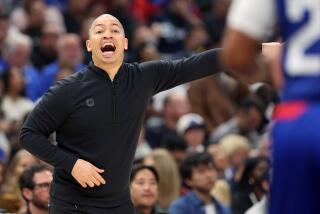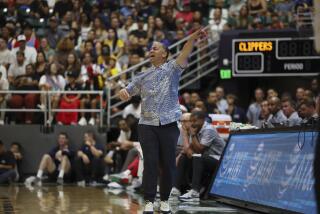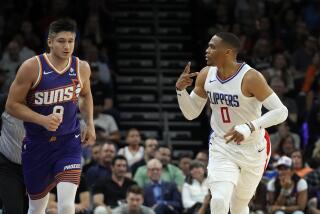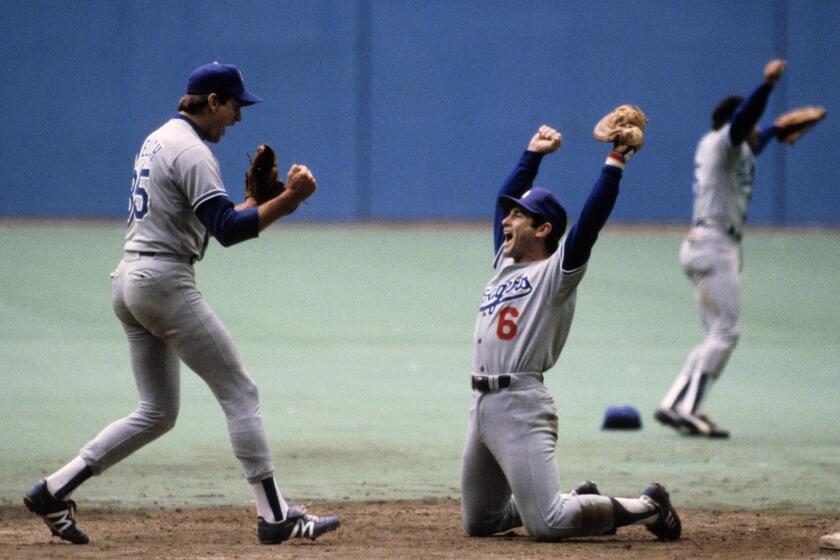Career before college? 11 Clippers say earning degree is still a goal
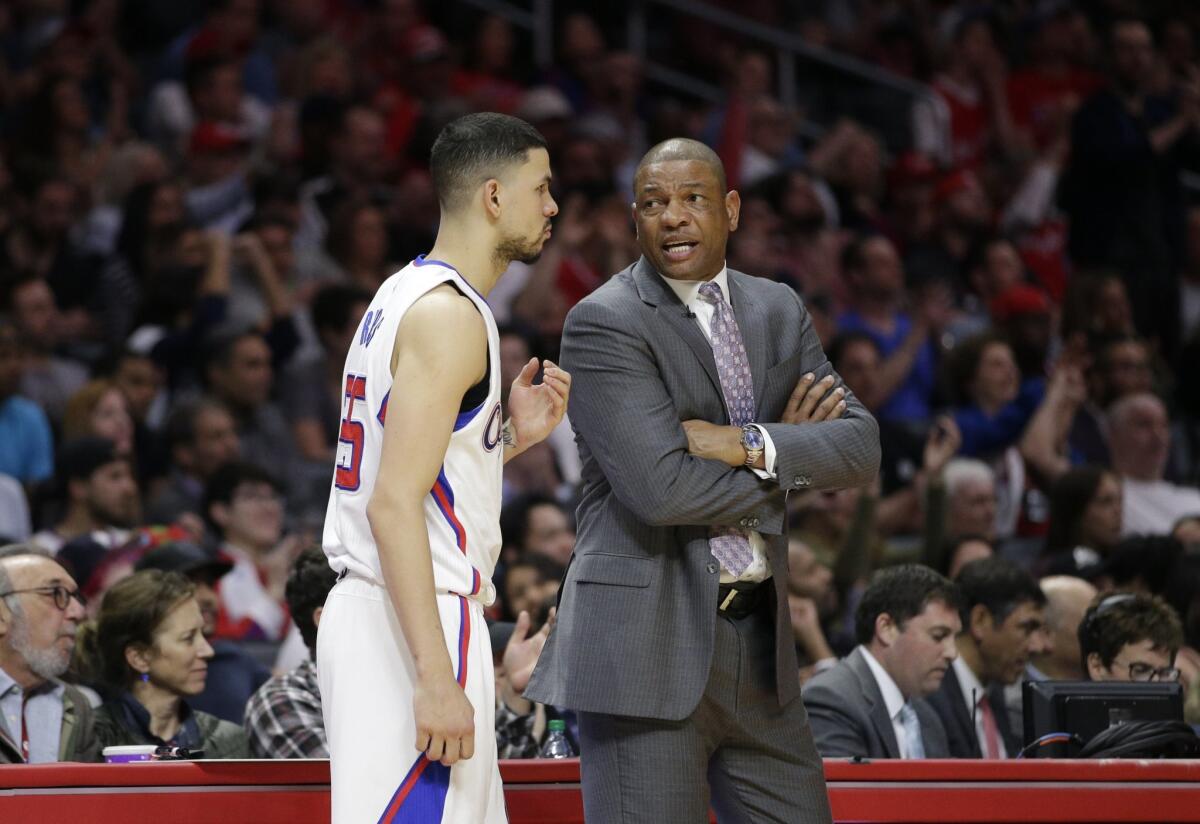
Spencer Hawes has spent seven times as long in the NBA as he did at the University of Washington, where he starred for one season before becoming a lottery pick in the draft.
The Clippers forward-center was on campus so briefly he didn’t even choose a major. He later discovered the classes he took didn’t help him make three-pointers or defend All-Star big men.
“No offense to some of the sciences and humanities and whatnot,” Hawes said, “but it’s not really my passion or proved to be that helpful later on in life.”
And yet, there is something tugging at him to complete his coursework.
He promised his mother he would do it.
Hawes isn’t an anomaly in the Clippers locker room. Each of the 11 players who have not obtained their college degrees said they planned to do so.
Of the four who have graduated — J.J. Redick, Ekpe Udoh, C.J. Wilcox and Dahntay Jones — Jones has already started work toward a master’s degree in business and Redick said he would like to get an MBA once his playing career ended.
It would be easy for NBA players to major in indifference about their college degrees when they already have millions in the bank and futures as secure as a brigade of armored trucks.
They rarely have a day off during a season that can last eight months and they like to spend summers training and traveling.
“It’s just so hard to do it,” point guard Austin Rivers said of going back to college, “because you’re so busy during the season and when you finally get time off, it’s like, do you want to go to school or actually spend time with your family?”
A degree would take some extra doing for Rivers because he spent only one year at Duke. He said he would prefer to take courses in the summer, meaning it could take seven or eight sessions to get his diploma.
The upshot to all that work would be a degree from one of the top schools in the country, which could lead to a job in broadcasting and later coaching.
A template for that path was created by Austin’s father, Doc, who returned to Marquette during summers early in his career with the Atlanta Hawks to finish his degree. Doc Rivers went on to become a broadcaster and now coaches the Clippers.
“I went back my first two years in the NBA,” the elder Rivers said. “Everyone told me, including my professors, ‘If you didn’t go back right away, you’re probably not going back,’ so I went back.”
Another avenue for back-to-school specials could open in the summer of 2017 if there’s a lockout, as widely expected. Udoh, the Clippers’ backup center, used the last work stoppage in 2011 to complete the final semester toward his degree in general studies from Baylor.
Udoh said the classes he needed were paid for by the school as part of his basketball scholarship. It wasn’t that odd being an NBA player on campus, he said.
“Shoot, I was another regular guy driving a nice car,” Udoh said.
The big debate among players who choose to go back to school is to be or not to be on campus. Many like the convenience of online classes but others have picked majors that lend themselves to more direct interaction with classmates and teachers.
“Drama major is kind of hard online,” point guard Nate Robinson said. “It doesn’t really make any sense.”
Robinson needs to finish one more year of coursework toward a degree he hopes would help him develop as an actor. He has already co-starred in the “Uncle Drew” Pepsi commercials alongside Cleveland’s Kyrie Irving.
Veteran forward Hedo Turkoglu is unique among his Clippers teammates because he never spent one day in college. Having started his professional career in Europe when he was 16, Turkoglu was ineligible to play collegiately in the United States because of amateurism rules. He said he would like to eventually get a degree in business management.
“Hopefully,” Turkoglu said of going to college, “it will make my transition a lot easier when I stop playing.”
That Jordan Hamilton was able to attend college at all was a massive achievement considering he was diagnosed with attention deficit hyperactivity disorder and received 22 F’s from seventh to ninth grades. The forward took medicine to help him combat the disorder and was accepted to Texas, where he spent two years before turning pro.
Now Hamilton hopes to complete a degree in communications that would allow him to become a television host after his NBA career.
Some might wonder what’s the point of twenty- and thirty-somethings giving it the old college try when their bank accounts rival the endowments of their respective schools. Clippers point guard Chris Paul has made roughly $116 million in salary alone during his 10 NBA seasons, not to mention the financial haul of imaginary twin Cliff through all the State Farm ads.
“A wise man once told me, ‘If you’ve got money, you don’t need a degree,’ ” quipped center DeAndre Jordan, who was drafted by the Clippers after one year at Texas A&M.
Jordan then turned serious and said he would like to finish college to appease his grandmother’s wishes.
Paul said he intended to take classes at Wake Forest in the coming months because he expected to spend the summer at home in North Carolina. He needs mostly electives to finish his degree in communications after completing much of his coursework in his major during his two years on campus.
“I’ve got to take like golf and all that,” Paul said.
His resolve to get his degree may be topped only by his determination to win an NBA championship.
“I told my mom, even if I have to walk with Little Chris,” Paul said, referring to his 5-year-old son, “I’m going to get it.”
Twitter: @latbbolch
More to Read
Go beyond the scoreboard
Get the latest on L.A.'s teams in the daily Sports Report newsletter.
You may occasionally receive promotional content from the Los Angeles Times.

